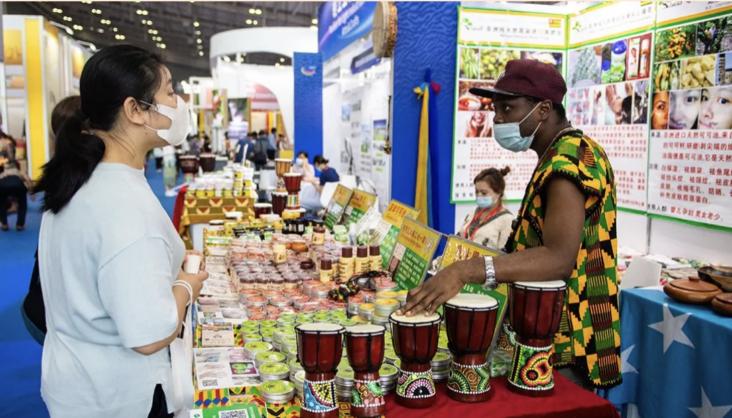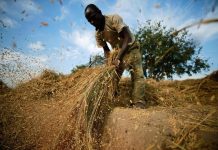Africa-Press – Angola. Is trade still dynamic, in sharp decline or completely insignificant? At a time when global inflation is reaching new heights and geopolitical balances are being reconfigured, we take a look at Sino-African relations and the issues underlying the partnerships between the continent and the Asian giant.
Beijing’s offensive on the continent was believed to have considerably slowed down in recent months. China, which has itself been shaken by the Covid pandemic, has been unusually reserved in Africa. And criticism (from the West, led by the US) of Beijing’s “massive loans” to some African countries, which lead to debt overhang, has monopolised the debate on China-Africa relations.
However, this is not the case. At least this is what the Chinese authorities are trying to show through their increased media coverage and initiatives over the past few weeks. Accused of not adhering to the G20’s common framework for restructuring the debt of countries in difficulty, China announced at the end of August that it would be cancelling 23 loans granted to 17 African countries and its intention to redirect the equivalent of $10bn of its Special Drawing Rights (SDRs) to Africa through the IMF.
“Those who accuse Beijing of trapping Africa with its debt now have a challenge: they too can give up equivalent amounts and release their SDRs [to the continent],” Guinea-Bissau economist Carlos Lopes said on social media.
But Thierry Pairault, a sinologist, socio-economist and director of research emeritus (CNRS/EHESS), sees it as a political move that costs China nothing, representing at best 1% of the African debt to Beijing, and whose economic impact is almost nil for Africa. Alhassane Diop, a Senegalese specialist on China-Africa, disagrees: “It is a strong gesture, a way of showing Beijing’s continued support for Africa.”
Relations at a high level
A few days earlier, the Middle Kingdom communicated the latest figures of its trade with the continent, demonstrating that trade relations between the two parties are in good shape. In fact, according to Chinese customs data, trade between China and Africa reached a value of $137.4bn during the first half of 2022, which represents an increase of 16.6% compared to the same period in 2021.
In detail, between 1 January and 30 June, Chinese imports from the continent increased by 19.1% compared to the first half of last year, reaching $60.6bn. China’s exports to Africa amounted to $76.8bn (+14.7%). These statistics confirm a trend already observed in the first quarter, during which the value of trade between the Asian giant and the continent was almost eight times higher than that of trade between the US and Africa, and 15 times higher in France’s case.
Although the second half of the current year looks less dynamic, due in particular to major disruptions caused by the “Zero Covid” policy which led to the closure of some Chinese ports and the confinement of several provinces, the Chinese government is optimistic. Beijing is banking on strengthening ties with its main African partners: South Africa ($54bn in trade in 2021), Nigeria ($26bn), Angola ($23bn) and Egypt ($19bn).
Negligible trade or fruitful co-dependence?
Pairault is not convinced that this trade relationship is important. According to the French expert, economic exchanges between China and the continent remain “negligible”. “Africa does not exist economically speaking for China, it makes up barely 3% of its trade. Europe and Asia each account for 18%, and the US 10%,” he told us. He added: “Africa is the one that has more interest in seeing its partnership with China intensify. Not the other way around.”
Diop does not share this opinion: “It must be understood that China and Africa are in a codependent relationship that is constantly growing. China is the continent’s leading supplier of finished products, so Africa is a major market for the sale of these goods, as well as a reservoir of raw materials.”
More and more African agricultural fields are being exploited by the Chinese, who export their yields. This way of doing things has to change, to enable Africa to achieve self-sufficiency.
Moreover, in order to boost its trade with the continent, Beijing is increasingly focusing on agricultural cooperation. At the China-Africa forum in Dakar in November 2021, China’s President Xi Jinping announced his intention to open “green corridors” for African agricultural exports. The aim here is to facilitate access for fresh African products to the vast Chinese market. Until then, only frozen products were allowed in, which penalised many African exporters. Recently, China has allowed the import of fresh avocados from Kenya, citrus fruits from Zimbabwe, soya beans from Tanzania, beef from Namibia and Botswana, and fruit from South Africa.
China, Europe, the US – who is helping Africa the most?
In all, 10 projects are already planned, 500 Chinese agricultural experts will be deployed to Africa, and $10bn in trade credit will be made available. And, as Foreign Minister Wang Wenbin’s spokesman pointed out at a conference on 16 August, “since the 2018 Summit on China-Africa Cooperation, 25 agricultural and food products from 14 African countries, including South Africa, Kenya, Benin and Egypt, have been allowed into China”.
The Middle Kingdom has become the second largest importer of African agricultural products, with an average annual increase in trade flows of 11.4% over the past 10 years. “We are confident that with the joint efforts of both sides, China-Africa agri-food trade will flourish and bring more benefits to the Chinese and African people,” he added.
We must not forget, moreover, that today anti-French sentiment is becoming increasingly strong in Africa. And that the US strategy, although it is more effective than Europe’s, is no match for China.
But, according to Pairault, “the agricultural experiments that China has conducted in Africa have not yielded convincing results […]. In comparison, France, through its agricultural research and international cooperation organisation (CIRAD), has more links with Africa in this respect.” Senegal’s Diop prefers to analyse this agricultural cooperation through a different prism: “More and more African agricultural fields are being exploited by the Chinese, who export their yields. This way of doing things has to change, to enable Africa to achieve self-sufficiency.”
Diop also now feels that Europe has other internal emergencies (because of the war in Ukraine), which means that China has less competition and therefore more room for manoeuvre on the continent. He adds: “We must not forget, moreover, that today anti-French sentiment is becoming increasingly strong in Africa. And that the US strategy, although it is more effective than Europe’s, is no match for China.”
For More News And Analysis About Angola Follow Africa-Press






